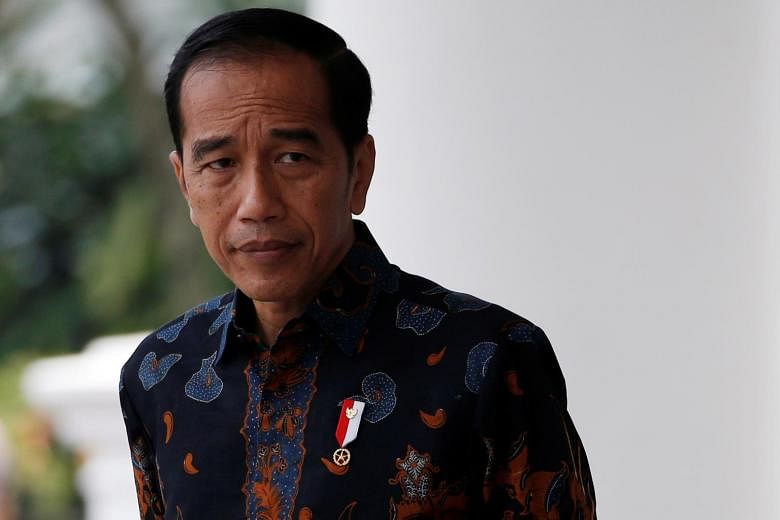JAKARTA (BLOOMBERG) - Indonesia's elites are edging closer to securing constitutional changes to strip President Joko Widodo of key powers in a move that could eventually end direct elections, presenting the most crucial test for democracy in South-east Asia's biggest economy since the downfall of the dictator Suharto in 1998.
The push to amend the constitution is gathering pace just months after a record turn-out saw the president, also known as Jokowi, win another five years in office with an increased majority.
It's being led by Suharto-era power brokers as well as former president Megawati Soekarnoputri, who observers say is dissatisfied with the level of influence she has had over Mr Joko despite his affiliation with her ruling Indonesia Democratic Party of Struggle, or PDI-P. The move also has the backing of Suharto-era power brokers.
The resistance comes just as Mr Joko seeks to use his second-term mandate to open up more sectors to foreign investors and professionalise the cabinet, which has been traditionally used as a source of cronyism for ruling coalitions.
The squabbling risks driving away investors just as a global slowdown and the US-China trade war make it more essential to unleash growth that under-performed during his first term.
"The investment climate has been problematic but it could become much worse," said Mr Kevin O'Rourke, who wrote a book on Indonesian politics after Suharto and has published a weekly newsletter for foreign investors since 2003.
"All of these moves are negative. They would bring about even worse governance, in practice, and in the process they would trigger unrest."
ELITE POWER
Suharto maintained power in Indonesia for more than three decades by appointing a majority of the bicameral legislature known as the People's Consultative Assembly, or MPR, which at the time elected the president and approved five-year plans to govern the country known as the Broad Guidelines of State Policy, or GBHN.
Several years after his demise, the country introduced direct elections for president and scrapped the guidelines so each candidate could campaign on unique policy proposals.
Now parliament is considering proposals that would restore the GBHN and end direct presidential elections, effectively returning power to the traditional elites who control political parties that dominate the legislature. Any constitutional amendment needs the support of two-thirds of the parliament to pass.
Top leaders in parliament have said the guidelines will ensure greater cohesion and continuity in setting policy.
Mr Ahmad Basarah, a deputy speaker of the legislature and a senior member of the ruling PDI-P, said in an interview the changes would ensure "the development road-map will not be disrupted just because of the likes and dislikes of the new president or the new ruling party."
The parliament should "take precedence" after the 2019 presidential election led to a sharp polarisation in Indonesia, Mr Bambang Soesatyo, the MPR's speaker, told the local media outlet Kompas on Aug 8.
"The direct presidential election is also complicated and expensive," Mr Bambang, a member of Suharto's political vehicle Golkar, was quoted as saying. "Why not just return it to the MPR?"
DYNASTIC CHALLENGE
Mr Joko has pushed back, telling the publication Tempo that the move will open a Pandora's box and pose a threat to the country's democracy. "Don't let democracy be in the hands of elites," he said on Aug 26 in Tempo. "Democracy must be held by the people."
Mr Teten Masduki, a spokesman for the president, declined to comment when reached by phone.
Mr Joko easily won a second five-year term in an April election, defeating Suharto-era general Prabowo Subianto by 11 percentage points in a rematch of the 2014 contest. Ahead of his inauguration on Oct 20, he's vowed sweeping reforms in his second term to boost investment, and create millions of jobs.
But as the first president not to come from Indonesia's political or military elite, he also represents a challenge to dynastic families accustomed to wielding control over the executive branch. Mr Joko, a furniture maker from Central Java, showed it's possible to appeal to the masses with the right combination of charisma and policy.
The candidates preferred by party chiefs "will not sell" if faced with a popular vote, said Ms Bivitri Susanti, a constitutional law expert and the founder of Jakarta-based Central of Law and Policy Studies. "So now what they are doing is seeking to usurp people's suffrage and control the election."
The plan to form a committee to look at amending the constitution received unanimous support in the parliament. Crucially, the top four parties in parliament - PDI-P, Golkar, NasDem and Prabowo's Great Indonesia Movement Party - have gone further. Following a meeting on Sunday, The NasDem party's chief Surya Paloh and Mr Prabowo declared they would push for "a comprehensive amendment" to the constitution.
Soekarnoputri, who first floated the idea, is a scion of Indonesia's first president. Golkar is run by Airlangga Hartaro, whose father was a minister in the Suharto regime for 15 years. Mr Prabowo was Suharto's son-in-law, and his father was the architect of economic policy during the regime.
The proposed changes would entrench the "sovereignty of the oligarchs," said Mr Arya Fernandes, a political analyst with the Jakarta-based Centre for Strategic and International Studies who has conducted polls for a decade. "It will be a setback for Indonesia's democracy."

